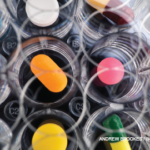NEW YORK (Reuters Health)—Subcutaneous golimumab every four weeks provides effective long-term maintenance for patients with active ulcerative colitis (UC), according to results from the PURSUIT-SC extension study.
The main PURSUIT-M study showed that golimumab treatment maintained clinical responses through Week 54. For most patients, maintenance therapy for UC is required long term.
Dr. Peter R. Gibson from Monash University and Alfred Health, Melbourne, Victoria, Australia, and colleagues examined the efficacy and safety through two years of maintenance golimumab among 177 responders in the PURSUIT-M study.
Of these patients, 86% maintained inactive or mild disease activity through Week 104, with similar results in the 50 mg and 100 mg groups. Just over half of the patients (56.4%) maintained inactive disease over that period, according to the April 28 Clinical and Translational Gastroenterology online report.
At the beginning of the extension study, 174 patients were not receiving corticosteroids, and 88.5% of these remained corticosteroid-free at Week 104.
Patient-reported outcomes, as measured by Inflammatory Bowel Disease Questionnaire (IBDQ) scores, remained similar from Week 54 through Week 104.
Adverse event and serious adverse event rates per 100 patient-years of exposure were similar through Weeks 54 and 104. Specifically, infection rates did not increase with continued exposure to golimumab, and rates of infections of special interest (sepsis, pneumonia, tuberculosis, opportunistic infections and cellulitis) remained low.
This study, the researchers conclude, shows that patients with moderate to severe active UC who respond to golimumab induction therapy and maintain this response through 52 weeks are “highly likely to maintain well-controlled disease activity over the ensuing year while continuing golimumab every four weeks. No new safety issues were identified, and the risks of adverse events noted for golimumab over 52 weeks continue at a similar rate during the second year of drug exposure.”
Dr. Alessandro Armuzzi from Catholic University, Rome, Italy, recently completed a risk-benefit analysis of golimumab in the treatment of refractory UC. He tells Reuters Health by email, “Patients were continuously under control every month up to one year. Translating into clinical practice, this is what we would like to obtain in every patient.
“Keeping UC under continuous control may translate into sustained remission free from steroids, mucosal healing, and improvement of quality of life,” he concludes.
Dr. Gibson did not respond to a request for comments.
Janssen Research and Development funded the study and analyses, employed four of the 12 authors, and had various relationships with six of the other authors.



